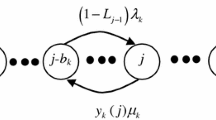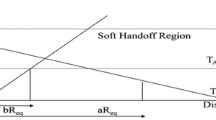Abstract
In this paper, we address the problem of user-class based service differentiation in CDMA networks. Users are categorized into three classes who get differentiated services based on their expected quality of service (QoS) from the service provider and the price they are willing to pay. We adopt a game theoretic approach for allocating resources through a two-step process. During a service admission, resource distribution is determined for each class. Then, the resource allocated to each class is distributed among the active users in that class. We devise a utility function for the providers which considers the expected revenue and the probability of users leaving their service provider if they are not satisfied with the service. Our model demonstrates how power can be controlled in a CDMA network to differentiate the service quality. Also, we show the impact of admitting high paying users on other users.
Similar content being viewed by others
References
IEEE tutorial on game theory applications in electric power markets, in: Proceedings of Winter Meeting IEEE Power Eng. Soc New York (1999).
T. Alpcan, T. Basar, R. Srikant and E. Atman, CDMA uplink power control as a non-cooperative game, in: Proceedings of the 40th IEEE Conference on Decision and Control, Vol. 1 (2001) pp. 197–202.
T. Basar and G.J. Olsder, Dynamic Non-Cooperative Game Theory, Mathematics in Science and Engineering, Vol. 160 (Academic Press Publications, 1982).
P. Bender, P. Black, M. Grob, R. Padovani, N. Sindhushyana and S, Viterbi, CDMA/HDR: A bandwidth efficient high speed wireless data service for nomadic users, IEEE Communications Magazine, 38(7) (2000) 70–77.
A.A. Lazar, A. Orda and D.E. Pendarkis, Virtual path bandwidth allocation in multimedia networks, in: IEEE/ACM Transaction on Networking (Dec. 1997).
A.B. MacKenzie and S.B. Wicker, Game theory and the design of self-configuring, adaptive wireless networks, IEEE Communications Magazine 39(11) (2001) 126–131.
J.F. Nash, Equilibrium points in N-person games, in: Proceedings of the National Academy of Sciences, Vol 36, (1950) pp 48–49.
A. Orda, R. Rom and N. Shimkin, Competitive routing in multiuser communication networks, IEEE/ACM Transaction on Networks, 1(5), (1993), 510–521.
E. Rasmusen, Games and Information: An Introduction to Game Theory (Blackwell, 1989).
A. Weiss, An introduction to large deviations for communication networks, IEEE Journal on Selected Areas in Communications 13(6) (1995) 938–952.
H.R. Varian, Microecomomic Analysis, 3rd edition (W.W. Norton and Company. Inc., 1992).
A.Y. Korilis and A.A. Lazar, On the experience of equilibria in non-cooperative optimal flow control, Journal of ACM 42(3) (1995).
Author information
Authors and Affiliations
Corresponding author
Additional information
Mainak Chatterjee received his Ph.D. from the department of Computer Science and Engineering at The University of Texas at Arlington in 2002. Prior to that, he completed his B.Sc. with Physics (Hons) from the University of Calcutta in 1994 and M.E. in Electrical Communication Engineering from the Indian Institute of Science, Bangalore, in 1998. He is currently an Assistant Professor in the department of Electrical and Computer Engineering at the University of Central Florida. His research interests include economic issues in wireless networks, applied game theory, resource management and quality-of-service provisioning, ad hoc and sensor networks, CDMA data networking, and link layer protocols. He serves on the executive and technical program committee of several international conferences.
Haitao Lin received the BE degree in radio engineering from Southeast University, Nanjing, China, in 1996, the MS degree in computer applications from the Beijing University of Posts and Telecommunications, Beijing, China, in 2000, and Ph.D. in Computer Science and Engineering from The University of Texas at Arlington in 2004. He is currently with Converged Multimedia Services System Engineering at Nortel, Richardson, Texas. His research interests include wireless network performance evaluation and enhancement, wireless link adaptation, wireless network resource management, and applied game theory.
Sajal K. Das received B.S. degree in 1983 from Calcutta University, M.S. degree in 1984 from Indian Institute of Science, Bangalore, and Ph.D. degree in 1988 from University of Central Florida, Orlando, all in Computer Science. He is currently a Professor of Computer Science and Engineering and also the Founding Director of the Center for Research in Wireless Mobility and Networking (CReWMaN) at the University of Texas at Arlington (UTA). Prior to 1999, he was a professor of Computer Science at the University of North Texas (UNT), Denton where he founded the Center for Research in Wireless Computing (CReW) in 1997, and also served as the Director of the Center for Research in Parallel and Distributed Computing (CRPDC) during 1995–97. Dr. Das is a recipient of the UNT Student Association's Honor Professor Award in 1991 and 1997 for best teaching and scholarly research; UNT's Developing Scholars Award in 1996 for outstanding research; UTA's Outstanding Faculty Research Award in Computer Science in 2001 and 2003; and the UTA College of Engineering Research Excellence Award in 2003. He is also frequently invited as a keynote speaker at international conferences and symposia.
Dr. Das' current research interests include mobile wireless communications, resource and mobility management in wireless networks, mobile and pervasive computing, wireless multimedia, ad hoc and sensor networks, mobile internet architectures and protocols, distributed and grid computing, performance modeling and simulation. He has published over 350 research papers in these areas in international journals and conferences, directed numerous industry and government funded projects, and holds five US patents in wireless mobile networks. He received four Best Paper Awards in the ACM MobiCom'99, ICOIN'01, ACM MSWiM'00, and ACM/IEEE PADS'97. He as the Editor in Chief of the Pervasive and Mobile Computing (PMC) journal and also as an Associate Editor of IEEE Transactions on Mobile Computing, ACM/Kluwer Wireless Networks, Parallel Processing Letters, Journal of Parallel, Distributed and Emerging Systems. He served as General Chair of IEEE WoWMoM'05, PerCom'04, IWDC'04, MASCOTS'02, ACM WoWMoM'00-02; General Vice Chair of IEEE PerCom'03, ACM MobiCom'00 and IEEE HiPC'00-01; Program Chair of IWDC'02, WoWMoM'98-99; TPC Vice Chair of ICPADS'02; and as TPC member of numerous IEEE and ACM conferences. He is Vice Chair of the IEEE Computer Society's TCPP and TCCC Executive Committees.
Rights and permissions
About this article
Cite this article
Chatterjee, M., Lin, H. & Das, S.K. Non-Cooperative Games for Service Differentiation in CDMA Systems. Mobile Netw Appl 10, 939–946 (2005). https://doi.org/10.1007/s11036-005-4450-8
Published:
Issue Date:
DOI: https://doi.org/10.1007/s11036-005-4450-8




